Too shocking to laugh and too funny to shock
View(s):‘Our Stories’ — nine short performances held to mark V Day drove home the message of Violence against Women and Girls in a striking manner, says Yomal Senerath-Yapa
That night, it seemed that the compact Barefoot café had expanded to accommodate an overdose of fashionable society. Interspersed among the elegant ladies and well-known faces were also a few bohemian figures in loud shirts. All of them were hungering for something new; something bold; something revolutionary; and something to take home.
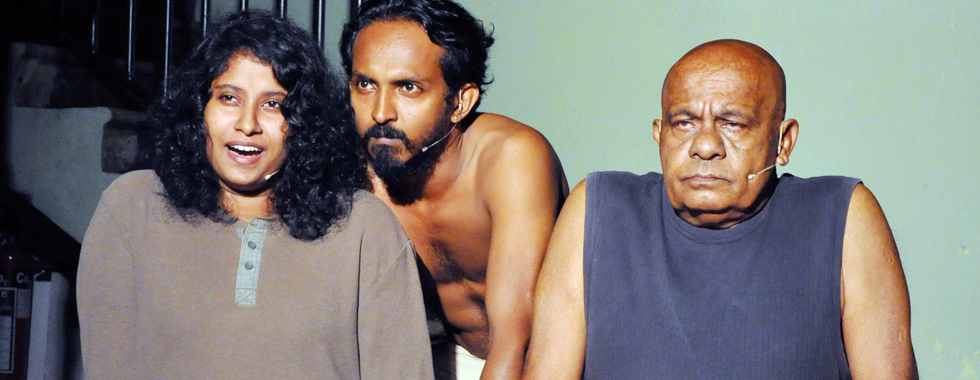
A dramatic moment from one of the plays
It was Colombo’s V Day, this time titled, Our Stories presented by the Grassrooted Trust. The ‘V’ in V Day is not just for ‘victory’, but for valentine, and vagina as well. Valentine because the day is usually celebrated on February 14 and vagina because it was Eve Ensler’s play, the Vagina Monologues, that sparked off the whole business of V Day- back in 1998.
The V day also has its formal title: ‘A Global Movement to End Violence against Women and Girls.’
Suddenly the café’s dim lights went out for the night, and then followed two of the shortest hours I have known.
Nine short theatre performances, directed brilliantly by Jith Pieris and Hans Bilimoria threw light on subjects lying behind the perimeter of normal Sri Lankan drawing room conversations.
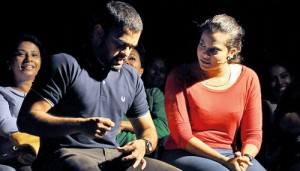
The nervous lover: Gehan Blok. Pix by Indika Handuwala
At times the situations seemed too comic to shock; at other times too shocking for anyone to dare laugh.
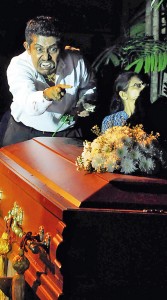
Controlling abuse: Indu Dharmasena
Several instances of gender-based violence were explored: violence perpetrated by friends, by relatives, by husbands, by boyfriends.
One skit that tore the audience between mirth and terrible antipathy had a comic bison of a husband, who had forcibly sold his wife to a brothel, now plotting with a lawyer to frame her for infidelity. The helplessness of poor and lower-middle class women struck the audience rudely.
There were three monologues- the most striking of which was by Danu Innasithamby. It was funny at the beginning, but then the characterbegan to describe his mother being assaulted by his father when he and his sister were but toddlers. It ended with soupcon of a suggestion that the character’s homosexuality and the childhood trauma he had known were linked.
When Michelle Herft appeared with clown make-up the audience did not know what to think. But in the course of the monologue in front of a full length mirror we realize that Michelle is playing a ‘trans woman’- born middle class; now a street-walker. A male character would have been
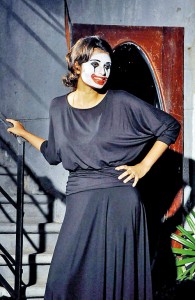
Pain behind the paint: Michelle Herft
more fitting for this skit, but Michelle managed to convey to the audience the loneliness and frustration of cross gender feelings. She showed that behind the painted, highly raffish glamour, lies a broken heart.
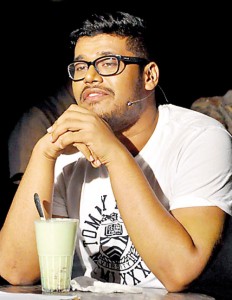
Tormented by the past: Danu Innasithamby
Indu Dharmasena in his monologue mourned over a closed coffin. The character’s wife had refused to stay like a goldfish in its pond, and had taken her own life. The violent desire of the husband to have complete control over his wife shook the audience. It was an ornament, a creature, or a potted plant he desired, not a companion. This monologue showed a more ‘genteel’, middle class form of gender-based violence-something hidden in plain sight.
One funny skit depicted two young lovers ‘planning’ sex. Gehan Blok played a boyfriend trying to impress his date- at times nervous; at times eager and trying to appear frisky, and hilarious throughout.
The funniest of all however was the skit where a headmistress and a teacher of a girls’ school sort through submissions to the school magazine, and come across a short poem which describes ‘something dubious’. Is it masturbation? Abuse by someone? Rape? The dispute that follows between the two teachers had the audience choking with laughter.
The show was realistic in a way rarely mastered. It was pithy, witty and moving, and the two hours seemed to have ‘fluttered away too fast’. But of course, whether it was successful or not can be determined only in the long run.


